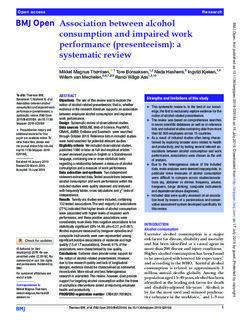| dc.description.abstract | Objectives: The aim of this review was to explore the notion of alcohol-related presenteeism; that is, whether evidence in the research literature supports an association between employee alcohol consumption and impaired work performance.
Design: Systematic review of observational studies.
Data sources: MEDLINE, Web of Science, PsycINFO, CINAHL, AMED, Embase and Swemed+ were searched through October 2018. Reference lists in included studies were hand searched for potential relevant studies.
Eligibility criteria: We included observational studies, published 1990 or later as full-text empirical articles in peer-reviewed journals in English or a Scandinavian language, containing one or more statistical tests regarding a relationship between a measure of alcohol consumption and a measure of work performance.
Data extraction and synthesis: Two independent reviewers extracted data. Tested associations between alcohol consumption and work performance within the included studies were quality assessed and analysed with frequency tables, cross-tabulations and χ2 tests of independence.
Results: Twenty-six studies were included, containing 132 tested associations. The vast majority of associations (77%) indicated that higher levels of alcohol consumption were associated with higher levels of impaired work performance, and these positive associations were considerably more likely than negative associations to be statistically significant (OR=14.00, phi=0.37, p<0.001). Alcohol exposure measured by hangover episodes and composite instruments were over-represented among significant positive associations of moderate and high quality (15 of 17 associations). Overall, 61% of the associations were characterised by low quality.
Conclusions: Evidence does provide some support for the notion of alcohol-related presenteeism. However, due to low research quality and lack of longitudinal designs, evidence should be characterised as somewhat inconclusive. More robust and less heterogeneous research is warranted. This review, however, does provide support for targeting alcohol consumption within the frame of workplace interventions aimed at improving employee health and productivity. | nb_NO |
